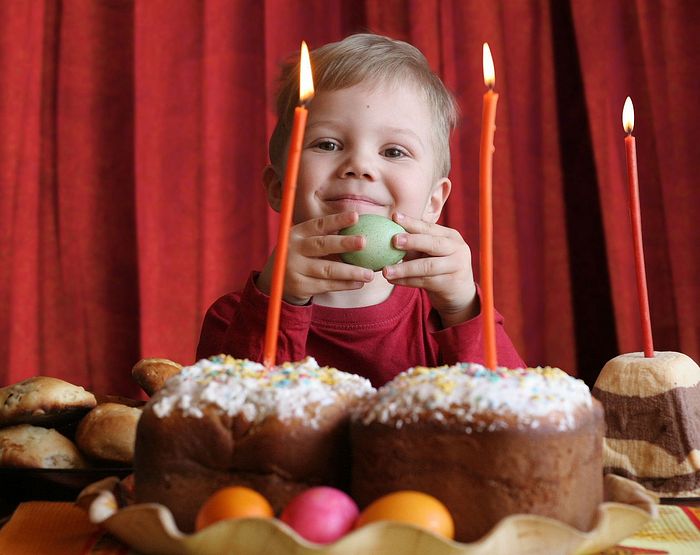The feast of the Resurrection of Christ is the most important for Christians. “Enjoy ye all the feast of faith: Receive ye all the riches of loving-kindness,” St. John Chrysostom summons us in his catechetical word on the feast of Pascha. The joy of the resurrected Savior is appointed for every man on earth, but not all know about it and not all understand how to join in this common exaltation. Igumen Nektary (Morozov) talks about how to share the joy of Pascha with others.
Light and warmth
Indeed, joy must always be shared, for if we’re called to share things representing our critical material needs, then all the more must we share with others that which is vastly more important—the spiritual joy which we experience. Although, I will make a qualification: of course, it is possible to share only that which you have. Therefore, to be truly able to give something useful to others to comfort their hearts, the joy of the Risen Christ must fill our own hearts—at least to some degree.
Much here depends on the path a man has tread during Great Lent, preparing to meet Pascha. If we only abstain from food, go to the services and pray a little more, and live a little more soberly and intently, but we don’t have a deep inner experience of all that precedes Pascha, no sense of our own imperfection, sins, infirmities, and no understanding of what Pascha is—it is not just a remembrance of some past triumph of life over death, but a triumph in which every one of us participates, because, in having defeated death, Christ has again opened the path to the eternal Heavenly Kingdom for all of us—then it will be difficult to experience the true joy of Pascha. If Great Lent became for someone the next step in his spiritual development, then, undoubtedly, he will pass the Paschal period not just as a time of relaxation from fasting, but as a time of celebrating the victory of light over darkness, life over death, and righteousness over sin. When it is received and experienced spiritually, then we want to share this spiritual exaltation. And then, even if those with whom we celebrated the feast and shared a meal are not very churchy, or maybe even barely believers, all the same, we probably will be able to share with them the light, and warmth, and joy filling our hearts, at least to some degree. And at the same time, we will be able to preserve ourselves from some excessive dispersion and distraction which can accompany the festal meal, and which can destroy that tiny bit that was built up in us during the fast.
How is this sharing of joy with others expressed? Precisely our inner content will tell us how our communication with others should be framed. The analogy is very simple: We all well know how difficult it can be with people inwardly ravaged or downcast with some bitterness and regret about how they have led their lives, and, conversely, how easy and joyful it is with those people who are full of light and warmth. If we become such by Bright Week, then the question will not arise within us of how to share our condition, or how to manifest and show it. It will simply flow out of us.
Is it worth it to start up a conversation with others about the feast of Pascha itself? Words are, after all, an instrument, and, as any other instrument, must be used as intended. After all, we’re not going to try to prepare food with a hammer, or a nail to blend with a food processor. Thus, words should not be used lightly. If we want to talk with people about Christ and about faith, then, of course, we must choose the time and circumstances for such a conversation, and the concrete words in which to vest our thoughts. In saying a word on Christ to those who are not ready, we thereby devalue it.
To visit those who understand?
Would it be correct if your family does not want to celebrate Pascha, for example, to spend the day not with them, but with churched people—perhaps with parishioners from your church? There is no single prescription for all situations. To leave your family and separate yourselves from them, especially on religious grounds, I think, is not worth it. Because if one person in the family goes to church, but another or two or three don’t go, as a rule, they will feel like the believing member of the family segregates himself from them and lives his own life—and it’s not necessary to aggravate this feeling in any situation. On the contrary, we should constantly try to curtail and heal any divisions that arise. If we can give something spiritual, we will give it, and if not, then why should we deprive our loved ones of participating in some material joys? Yes, right now they cannot understand Who Christ is and what the Resurrection of Christ is, but a covered table and the smiling face of a loved one they can understand. And I think it is quite possible to share this with them, and necessary. It is the most important thing.
You will go to church and meet with those who understand you at the services or at some activity in the life of the parish, but it seems to me that looking to spend festal days outside of home too is a kind of escape—it’s totally wrong. Family, in the end, is your sphere of responsibility. You give answer for these people, because you have already come to God, and, at least in this sense, you are older than them. Therefore, answer for this and be with them.
Time for good works
It is totally natural to share your joy, both material and, if possible, spiritual, in the Paschal season, with those who are lacking something essential in their lives and in need of attention and engagement. But there are many more of them than we can reach. Therefore, for example, the recipients of our charitable deeds at Sts. Peter and Paul Church, where I am the rector, are those social institutions that we’ve already developed some kind of relationship with, or those who happen to be within sight.
Of great help in this is the aid provided us by the “Julienne” food chain famous in Saratov: for a number of years already before Pascha they donate quite a large number of kulichi of their own making. And thanks to this we have the chance to give them out in a few Saratov hospitals, including the children’s ward of the hematology clinic, the psychiatry clinic at Altynai Mountain, and the Center for social and labor rehabilitation for people without a specific residence or occupation. For us, this opportunity is truly joyful.
But just to spend time distributing kulichi and some gifts is not enough, and therefore, when possible, we send a special missionary group of volunteers and choir members to these wards, to talk about the feast and gladden the ear and heart of those they’re visiting. This is just the most basic way to share your Paschal joy. The exact means of Paschal greetings depends, as a rule, on the abilities of whoever is doing it. In one church they put together some theatrical productions, and in another a concert, and in another they make handicrafts.
If they don’t have such activities at some parish for this or that reason, but one of the parishioners has the desire and concrete ideas, then, of course, you can speak with the rector and come forward with such an initiative. After all, the priest is so immersed in the daily cares and needs of the parish, the burden of which he has no one to share with sometimes, that many good ideas and desires that come to his mind go unrealized—again, there’s simply no one to implement them. If people appear, ready to do something, then the ideas and the strength to implement then will appear too.
Of course, it’s necessary to form a circle of people to take up such tasks, but sometimes the rector of the church turns to his parishioners, and none of them have the desire to help, or, conversely, the people respond, but when it comes down to it, the priest has to do everything himself.
Unfortunately, today, all such charitable acts from us are quite defective. If we had the necessary material and organizational-technical base, as the Catholic church has, for example, we could develop whole programs and implement them systematically. But our possibilities are quite modest, and we can act only to the extent of our capabilities. If there wasn’t such a limited number of people in Saratov like the head of “Julienne,” but dozens and hundreds, then, undoubtedly, we would be able to cover a much larger number of elderly, and children, and sick. After all, there’s plenty of wealthy people in Saratov, but very few willing to take part in something, unfortunately. Experience shows that out of a hundred people who our volunteers turn to for help, one or two respond. And this is probably one of Saratov’s main problems. Our other problems—roads, and some kind of domestic disorder—pale in comparison with indifference.
You don’t even have to call those who want to help. People offer help on their own, and not only just before Pascha, but on the eve of other feasts too.
Really, anyone can become a volunteer independently. If you see, for example, a lonely grandma or grandpa living near you, or someone who for other reasons has little joy in his life, then go see them and greet them with the joy of Pascha—it’s a very good thing to do. Yes, some will be glad and thankful, some will not open the door, and some might even cook something for you—it’s impossible to predict. And don’t forget, if you’re going to share your joy, and you’re treated with suspicion or your attempts are not accepted, don’t immediately lose this joy. And never, in any situation, allow any kind of conflict, so this good deed does not become a bad one.






